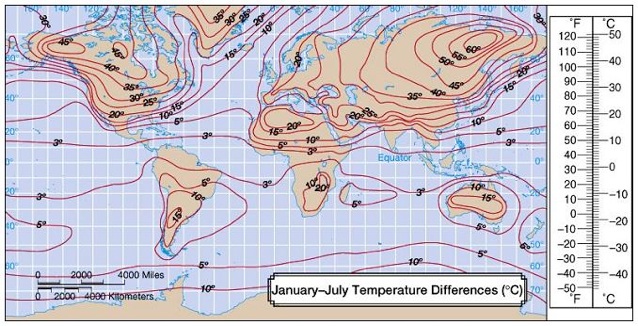

Continentality is a word used to describe the degree to which the climate of an individual place is influenced by being on a continental mass, where solar heating of land dominates rather than the slower solar heating of ocean. The map above quantifies one indicator, the difference between January and July temperatures. Coastal locations show moderate values compared to midcontinent locations. The largest differences are within the largest continents.
Lakes present a complication. Like oceans, they heat up slowly compared to land. If they are large lakes they do have well developed coastal wind patterns related to day and night. It preserves warmth in the fall and winter, which extends the growing season for coastal locations which are near warmed bays near the lake, like Bayfield and Baraga. It also leads to moderation of winter temperatures for coastal locations. During cold weather in December or January, it is common for winter temperatures in Houghton to be 10-20 warmer than places like Rhinelander or Madison because the lake warms the air and counteracts continental winter cooling. So in the midst of a large continent, lakeshore locations have strong seasons but enjoy some aspects of coastal climate.
Lake effect snow is a very important aspect of large lakes. It is greatly enhanced by continentality because continentality decreases temperature and humidity of polar winds that blow from the north over the lake and lead to snow.

wps.prenhall.com/esm_aguado_uwac_3/11/2880/737428.cw/index.html
